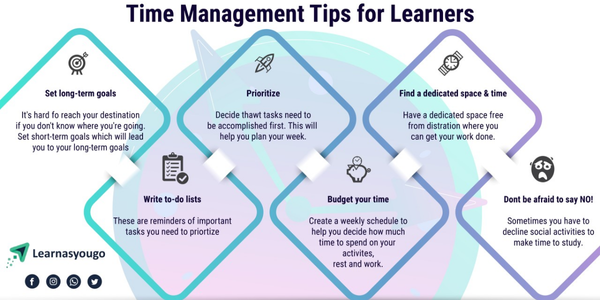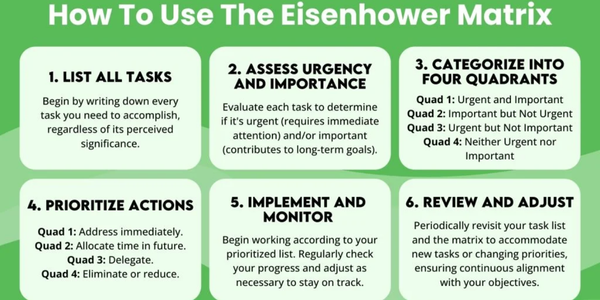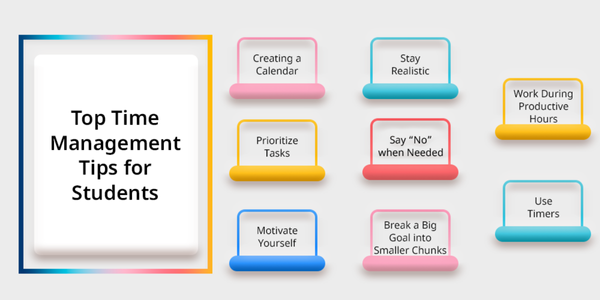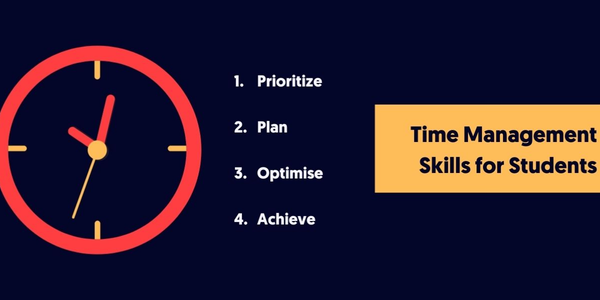High school can feel like a whirlwind—classes, assignments, sports, social life, family responsibilities. If you’re a student juggling all of this, you might often find yourself saying, “There’s just not enough time!” The truth is, there is enough time—if you manage it well. That’s where learning effective time management tips for high school students can make all the difference between feeling overwhelmed and being in control.
Let’s dive into practical, actionable strategies to help you balance your academics, activities, and downtime like a pro.
Why Time Management Matters in High School
Time is one of the most valuable assets a high school student can learn to manage. It’s not just about getting homework done—it’s about reducing stress, performing better academically, and having more time for the things you love.
Real-World Benefits of Time Management:
-
Better grades: More consistent study habits lead to better performance.
-
Less stress: No more last-minute cramming or missed deadlines.
-
More free time: With a plan in place, you can make time for hobbies, friends, and relaxation.
-
Prepares you for college and career: Good habits now pay off in the future.

1. Set SMART Goals
Before you can manage your time, you need to know what you’re aiming for.
What Are SMART Goals?
SMART stands for:
-
Specific
-
Measurable
-
Achievable
-
Realistic
-
Time-bound
Example:
Instead of saying, “I want to study more,” try: “I will study math for 30 minutes every day at 5 PM for the next two weeks.”
Setting SMART goals helps you stay focused and accountable.
2. Use a Planner or Digital Calendar
Whether it’s a paper planner or an app like Google Calendar or Notion, having a visual layout of your day, week, and month is essential.
How to Use Your Planner Effectively:
-
Write down deadlines and exam dates.
-
Schedule homework time in blocks.
-
Plan extracurricular activities.
-
Don’t forget to schedule breaks and free time.
Digital tools even allow reminders and sync with multiple devices—perfect for on-the-go students.
3. Prioritize Your Tasks with the Eisenhower Matrix
Time management isn’t just about doing everything—it’s about doing the right things first.
Eisenhower Matrix Explained:
| Urgent | Not Urgent |
|---|---|
| Important: Do now (e.g. homework due tomorrow) | Important: Schedule (e.g. college applications) |
| Not Important: Delegate (e.g. group tasks) | Not Important: Eliminate or limit (e.g. excessive scrolling) |
This matrix helps you focus your energy on what truly matters.

4. Break Down Big Projects
One of the biggest mistakes students make is waiting until the last minute to start a major assignment.
The Power of Chunking
Instead of tackling a 10-page essay the night before, break it into steps:
-
Research topic (Monday)
-
Create outline (Tuesday)
-
Write draft (Wednesday-Thursday)
-
Edit and proofread (Friday)
This approach prevents overwhelm and improves the quality of your work.
5. Avoid Multitasking
While it might feel productive, multitasking actually decreases efficiency. Switching between tasks reduces your focus and increases mistakes.
Try This Instead:
-
Focus on one subject at a time.
-
Use the Pomodoro Technique:
Study for 25 minutes, then take a 5-minute break. After four rounds, take a longer 15–30 minute break.
This improves concentration and prevents burnout.
6. Learn to Say “No”
It’s okay to turn down an event or activity when your plate is full. High-achieving students often stretch themselves too thin trying to do it all.
Tips for Saying No Politely:
-
“Thanks for thinking of me, but I need to focus on school this week.”
-
“I’d love to help, but I’ve already committed to something else.”
Saying no is saying yes to your priorities.

7. Create a Productive Study Environment
Your environment plays a huge role in how effectively you use your time.
Set Up a Study Space That Works:
-
Quiet and free of distractions
-
Well-lit and comfortable
-
Stocked with supplies
-
Phone on silent or in another room
If your home is too noisy, consider the library or a quiet coffee shop.
8. Use Technology Wisely
Tech can either help or hinder your time management.
Time-Saving Apps for Students:
-
Todoist – Task manager
-
Forest – Stay focused by planting virtual trees
-
Google Calendar – Schedule classes and reminders
-
Notion – All-in-one workspace for planning and notes
Just make sure you’re not spending more time organizing than actually doing the work.
9. Build Consistent Routines
Routines eliminate the need for willpower. Once a habit is established, it becomes automatic.
Sample Evening Routine for High School Students:
-
5:00 PM – Break/snack
-
5:30 PM – Homework session 1
-
6:30 PM – Dinner
-
7:00 PM – Homework session 2 or review
-
8:00 PM – Relax or prepare for tomorrow
-
9:30 PM – Wind down for bed
Stick to your routine for at least 2–3 weeks to make it stick.

10. Reflect and Adjust Weekly
At the end of each week, spend 10–15 minutes reviewing:
-
What worked well?
-
What didn’t go as planned?
-
What can I do better next week?
Keeping a journal or reflection log builds self-awareness and helps you continuously improve.
Bonus Tips for Specific Scenarios
Time Management for Students with After-School Jobs
-
Use your weekends wisely for major assignments.
-
Block out “non-negotiable” work hours and plan around them.
-
Communicate with teachers if you’re falling behind.
Time Management During Exam Season
-
Create a revision schedule by subject.
-
Focus on active recall (flashcards, practice tests).
-
Avoid cramming—space out your studying.
Common Mistakes to Avoid
-
Overloading your schedule
-
Underestimating how long tasks take
-
Skipping breaks
-
Not getting enough sleep
Remember, managing your time also means managing your energy.

Final Thoughts: You’re in Control of Your Time
Time management is not about being busy—it’s about being intentional. Every hour is a choice. As a high school student, developing these skills early will set you up for success in college, your career, and beyond.
Start small. Choose just one or two tips from this guide and put them into action this week. Over time, you’ll find your rhythm—and feel more confident, capable, and calm.
What’s Your Favorite Time Management Tip?
Have a routine that works for you? Tried a productivity app that changed your study habits? Share your experience in the comments below—we’d love to hear from you!
Looking for more? Check out our other posts on study techniques and exam stress management.


